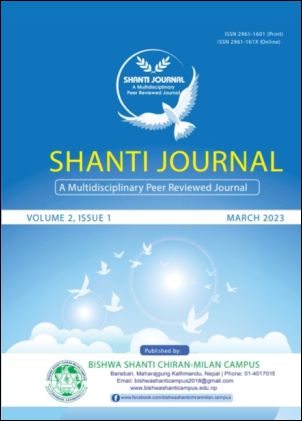A Marxist Reading of the Story, “Hansel and Gretel”
DOI:
https://doi.org/10.3126/shantij.v2i1.53739Keywords:
classes, discrimination, feudalism, haves-and-have-nots, MarxismAbstract
This paper analyzes the story “Hansel and Gretel” from the Marxist point of view. This children’s story is the story of haves-and-have-nots. The conflict between these two classes: the upper class and the working class is a non-stop process. There is a conflict between the witch and the children: the upper class and working class, feudalism and Marxism. Theoretically, feudal society is out of practice but it is still going on. This conflict is because of discrimination. The working-class people are suffering from the upper-class people’s domination and discrimination. The findings of the study show that the discrimination between upper-class and working-class people is never ending process. Society still has a feudal mentality. In every sector, discrimination is as usual. The upper class or high-ranking people dominate the working class or low-ranking people. This paper focuses on how to minimize the feudal discriminating mentality. The grounded feudal system is more dangerous than the surface-level feudal system. The study adopts the Marxist approach to analyze the story. Millions of people struggled and sacrificed for providing economic freedom to the working class people for ages so that the gap between them would fill up, but their sacrifice has not been meaningful. The change, which is nominal, is not satisfactory. Monetary power beats almost all kinds of power in the world. Exceptionally, intellectual powers seldom beat some orthodox power but money, which is all in all in the world of the American dream, is the major cause of discrimination.
Downloads
Downloads
Published
How to Cite
Issue
Section
License
Copyright (c) 2023 Copyright 2023 © The Author(s). The publisher may reuse published articles with prior permission of the concerned author(s). The work is licensed a Creative Commons Attribution-NonCommercial 4.0 International License . www.nepjol.info/index.php/shantij

This work is licensed under a Creative Commons Attribution-NonCommercial 4.0 International License.
This license enables reusers to distribute, remix, adapt, and build upon the material in any medium or format for noncommercial purposes only, and only so long as attribution is given to the creator.




